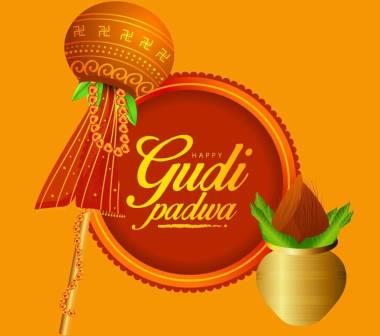Gudi Padwa
Posted on March 18, 2018
The true flavour of India, lies in its diversity of customs, traditions, cuisines and the never ending festivities that keep the celebratory spirit in full swing all-round the year. So, just as we recover from the hangover of the ”Holi dhamal”, we have yet another reason to revel in some home-made sweets, dress up in traditional attires, decorate our homes and indulge in some festive merriment.

18 th of March, 2018 will be celebrated as the commencement of the traditional Hindu New Year, with much zeal and fervour in the western, eastern and southern parts of India. In Maharashtra, especially, this day is celebrated with a lot of enthusiasm, as Gudi Padwa, signifying the beginning of the traditional Marathi New Year as per the lunisolar Hindu calendar. It also marks the end of the harvesting season of the rabi crop and the transition to the next season.
This spring time festival has many significances and mythological anecdotes attached to it. Apart from its connection to the agrarian calendar, this day also derives its importance from few ancient beliefs. For some it is the mythical day on which Lord Brahma created time and universe and for others it is believed to be the day of the coronation ceremony of Lord Ram post his victorious return from the battle with the evil king and the abductor of Queen Sita, Ravana. For some communities in rural Maharashtra this day is linked to Lord Shiva’s revered dance. Just like this auspicious day holds different meanings to different communities, so is it fondly referred to with different names in different regions. Telugu Hindus celebrate this festival as “Ugadi”, Konkani and Kannada Hindus celebrate the occasion as “Yugadi”, while in north eastern state of Manipur it is celebrated as “Sajibu Nongma Panba Cheiraoba”.
Like any other Indian festival, no stone is left unturned to celebrate this day with the usual festive grandeur. In urban households across Maharashtra, this auspicious day starts with cleansing of the bodies and soul with a holy bath, using special oils and aromatic soaps. In the villages, people may take a dip in the sacred river near the village temple. Following this exercise of purifying the mind, body and soul, the ladies of the house draw up their creative instincts and set themselves to the task of decorating their homes with some elaborate and very appealing “rangoli”. The colours of the rangoli, reflect the welcoming of the New Year, with hopes that the year be filled with colours of love, peace, prosperity and happiness. Rangoli is also believed to ward off evil and evoke positive energies in the house. The doorstep and the interior of the house are also decorated with scented flowers to create an atmosphere of sanctity and grace.
Who doesn’t enjoy playing “dress up”? Everyone does! Nobody lets go an opportunity to get all decked up and click those stunning “selfies” with friends and family. Keeping the age old tradition alive, on this auspicious occasion, women get draped in their beautiful nine yard saree, while the men look all dapper in their quintessential kurta pyajamas.
Now coming to the most important ritual of this occasion, hoisting of the “Gudi” or the doll. This Gudi is created by assembling together, an inverted Kalash (in place of the face of the doll), a bamboo stick, some mango and neem leaves and garlands to adorn our Gudi. This catchy looking creation is positioned at the doorstep or near the window, where it is visible to visitors and passers-by. It symbolizes prosperity and the arrival of new and good things in life.
For all those foodies at heart, the extensive lip-smacking dishes that are made on any festival are the very reason to celebrate that festival. Every festival has one delicacy that is exclusively made as a part of its celebration. Gudi Padwa is no different from other festivities even in this context. On this special day, people feast on a unique preparation made from the bitter sweet combination of jaggery and neem. This combination also holds a greater message, “Life comes in all flavours”. This year, like every past year, Gudi Padwa will be celebrated with all these essential elements. Hope you all have a wonderful Gudi Padwa. And may the coming months bring to you success, health, wealth and lots of SWEET DROOL WORTHY MANGOES!

